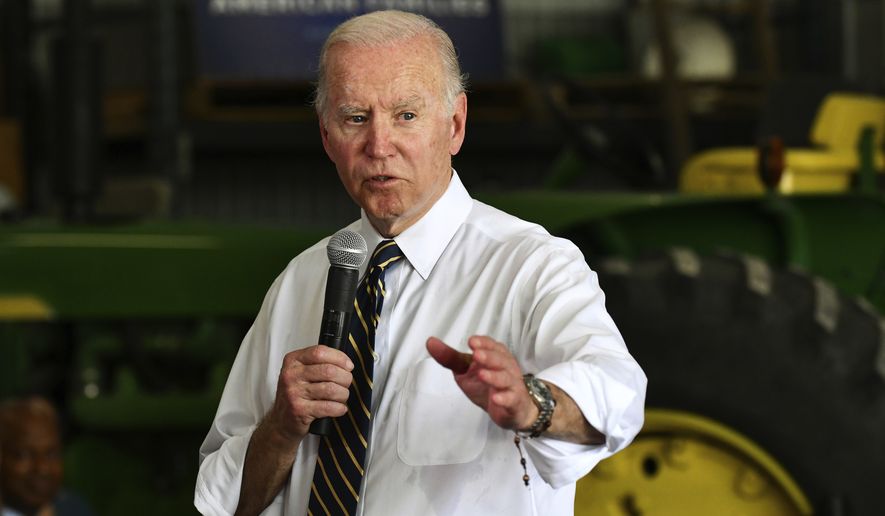President Biden told global leaders Thursday to contend with both the coronavirus and complacency by expanding COVID-19 vaccinations and thwarting variants that could disrupt the shift to post-pandemic life, even as he grumbled that lawmakers at home were stymying his own ambitions.
Speaking online in the second global COVID-19 summit, Mr. Biden boasted about record donations of vaccines and said the National Institutes of Health will share “stabilized spike protein” technology that will help other countries manufacture shots.
“We have to invest now. We have to secure political commitments now,” Mr. Biden said. “We have to start working to prevent the next variant and the next pandemic now. That’s going to require all of us to do more.”
Mr. Biden rallied the world even as he combats stiff challenges at home. He ordered flags to be flown at half-staff Thursday as the U.S. death toll from COVID-19 approached 1 million.
“It’s grief shared by people across all of our nations. Around the world, many more millions have died,” he told the summit. “Millions of children have been orphaned. With thousands more dying every day, now is the time for us to act, all of us together.”
Mr. Biden positioned the U.S. as a global leader in vaccine support for the world early in his term, though Congress is foiling his efforts to maintain that status. Lawmakers cut $5 billion in global funding from a bipartisan Senate package to fund the response.
The $10 billion that remained for the domestic response is in limbo as Republicans target the administration’s decision to lift Title 42, a pandemic measure that made it easy to turn away migrants at the southern border.
“I continue to call on Congress here at home to take the urgent action to provide emergency COVID-19 funding that is vital to protect Americans. To make sure that we maintain our supplies of COVID-19 tests, treatments and vaccines, including next-generation vaccines that are being developed,” Mr. Biden said at the summit. “The request also includes $5 billion to keep up our global partnership in the fight against COVID-19.”
Vice President Kamala Harris underscored the struggle for new funding, telling leaders the administration is “hard at work in Washington” to bolster the effort.
“We will continue to advocate for these lifesaving resources as part of our global commitment,” she said. “In our collective words and actions, we are all making clear complacency is not an option.”
Mr. Biden convened the first COVID-19 summit in September.
At that time, getting enough shots to poorer countries was the focus, but the effort has pivoted to new problems, including hesitancy about the vaccine and last-mile hurdles in getting the shots transferred and stored properly.
“Supply is no longer the key constraint to COVID vaccination globally. Countries face difficulties getting vaccines from tarmacs into arms, particularly for vulnerable populations and people in rural communities. Canada is going to be there with support,” said Canadian Prime Minister Justin Trudeau.
The U.S. has committed to donating over 1 billion doses of the Pfizer-BioNTech vaccine to the world, making it a world-leader. Mr. Biden said the lack of funding from Congress will make it difficult to support the administration of the vaccines.
Also, the White House said $20 million from Mr. Biden’s 2021 coronavirus-relief package will be used to scale up “test to treat” programs in eight low- and middle-income countries this year, so people can get tested and receive antiviral treatments at the same site.
The White House characterized the initial global effort as “a down payment on U.S. leadership that can be fully realized if Congress acts to provide the president’s requested COVID-19 supplemental funding.”
The U.S. was joined Thursday by Belize, which chairs the CARICOM group in the Caribbean; Germany, as holder of the Group of Seven presidency; Indonesia, as holder of the Group of 20 presidency; and Senegal, as the African Union chair.
The session also featured World Health Organization Director-General Tedros Adhanom Ghebreyesus, European Commission President Ursula von der Leyen, Indian Prime Minister Narendra Modi and newly elected South Korean President Yoon Suk Yeol, among other leaders.
Mr. Biden said the U.S. will supply $450 million for the pandemic preparedness and global health security fund that will be established at the World Bank this summer.
“Now is the time for us to act. All of us, together,” Mr. Biden said. “We have to double down on efforts to get shots in people’s arms. Country by country, community by community.”
Leaders plotted a way forward while East Asia offered glaring reminders of the virus’s staying power.
North Korea imposed a nationwide lockdown Thursday after the reclusive country confirmed an outbreak after claiming for two years it had boxed out the virus, according to The Associated Press.
Leader Kim Jong-un even wore a mask in public, though the scale of transmission wasn’t clear in the East Asian nation of 26 million that is ill-equipped to handle a health crisis.
Neighboring China is wielding sweeping lockdowns as part of its zero-COVID approach to the virus.
However, the WHO and other public health experts say draconian restrictions will not be sustainable in the face of fast-moving variants so Beijing should focus on effective vaccines.
For more information, visit The Washington Times COVID-19 resource page.
• Tom Howell Jr. can be reached at thowell@washingtontimes.com.




Please read our comment policy before commenting.